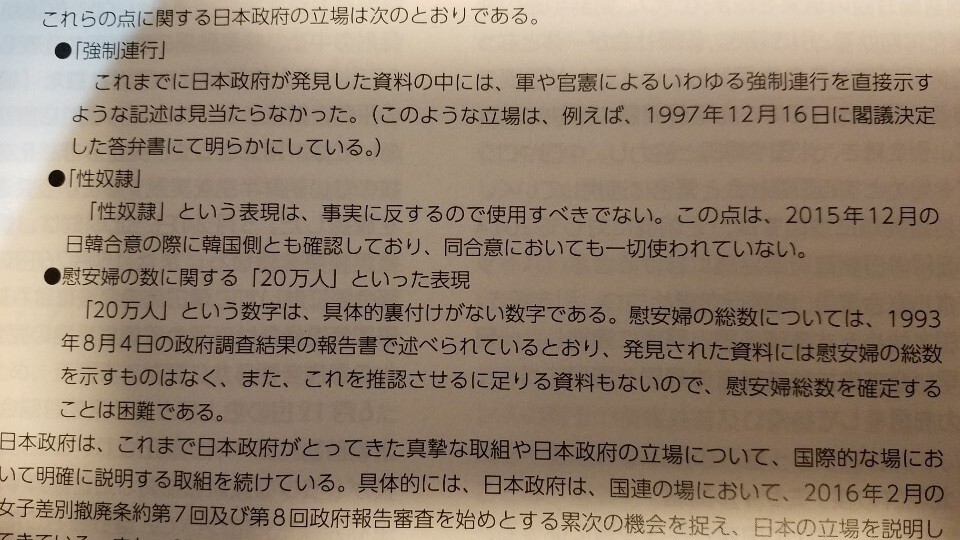hankyoreh
Links to other country sites 다른 나라 사이트 링크
Japan’s Diplomatic Bluebook states term “sex slaves” should not be used for comfort women

The 2019 edition of Japan’s Diplomatic Bluebook stated that the term “sex slaves” should not be used in connection with the Japanese military comfort women issue because it “contradicts the facts.”
Controversy is brewing after the publication of an official Japanese government document stating that the term “sex slaves” should not be used in connection with Japanese military comfort women survivors, a position it describes as having been “confirmed” by the South Korean government.
In a section referencing the issue of sex slaves drafted as “comfort women” under the Japanese military, the Diplomatic Bluebook published this year by Japan’s Foreign Ministry states, “The expression of ‘sex slaves’ contradicts the facts so that it should not be used. This point was confirmed with the ROK on the occasion of the Japan-ROK [comfort women] Agreement in December 2015 and the expression ‘sex slaves’ is not used in the agreement.” The passage implied that the South Korean government had confirmed that the victimization of the comfort women did not constitute sexual slavery.
The Japanese government’s decision to drag the South Korean government into its added explanation on the comfort women issue in the 2019 Diplomatic Bluebook appeared motivated by objections to Seoul’s review of the comfort women agreement in question. The 2019 Diplomatic Bluebook was also released in April 2019, after the South Korean government’s official announcement in November 2018 that it was disbanding the “Reconciliation and Healing Foundation” established in accordance with the comfort women agreement.
On Nov. 11, the South Korean Ministry of Foreign Affairs (MOFA) said, “What South Korea agreed to [in 2015] was simply that our official term of reference for the comfort women issue was the ‘issue of Japanese military comfort women victims’” -- suggesting that it never agreed to not using the term “sexual slavery.” After President Moon Jae-in took office, a 2017 report by a South Korean task force examining the comfort women agreement process reiterated a similar argument to MOFA’s rebuttal.
By Cho Ki-weon, Tokyo correspondent
Please direct comments or questions to [english@hani.co.kr]

Editorial・opinion
![[Column] Season 2 of special prosecutor probe may be coming to Korea soon [Column] Season 2 of special prosecutor probe may be coming to Korea soon](https://flexible.img.hani.co.kr/flexible/normal/500/300/imgdb/original/2024/0426/3317141030699447.jpg) [Column] Season 2 of special prosecutor probe may be coming to Korea soon
[Column] Season 2 of special prosecutor probe may be coming to Korea soon![[Column] Park Geun-hye déjà vu in Yoon Suk-yeol [Column] Park Geun-hye déjà vu in Yoon Suk-yeol](https://flexible.img.hani.co.kr/flexible/normal/500/300/imgdb/original/2024/0424/651713945113788.jpg) [Column] Park Geun-hye déjà vu in Yoon Suk-yeol
[Column] Park Geun-hye déjà vu in Yoon Suk-yeol- [Editorial] New weight of N. Korea’s nuclear threats makes dialogue all the more urgent
- [Guest essay] The real reason Korea’s new right wants to dub Rhee a founding father
- [Column] ‘Choson’: Is it time we start referring to N. Korea in its own terms?
- [Editorial] Japan’s rewriting of history with Korea has gone too far
- [Column] The president’s questionable capacity for dialogue
- [Column] Are chaebol firms just pizza pies for families to divvy up as they please?
- [Column] Has Korea, too, crossed the Rubicon on China?
- [Correspondent’s column] In Japan’s alliance with US, echoes of its past alliances with UK
Most viewed articles
- 1‘We must say no’: Seoul defense chief on Korean, USFK involvement in hypothetical Taiwan crisis
- 2AI is catching up with humans at a ‘shocking’ rate
- 3Is Japan about to snatch control of Line messenger from Korea’s Naver?
- 4Division commander ordered troops to enter raging flood waters before Marine died, survivor says
- 5[Column] Season 2 of special prosecutor probe may be coming to Korea soon
- 6Is N. Korea threatening to test nukes in response to possible new US-led sanctions body?
- 7[Guest essay] The real reason Korea’s new right wants to dub Rhee a founding father
- 8Korea sees more deaths than births for 52nd consecutive month in February
- 9[Editorial] Korea’s surprise Q1 growth requires objective assessment, not blind fanfare
- 10One Hyundai worker suffers through 16 piecemeal contracts in 23 months